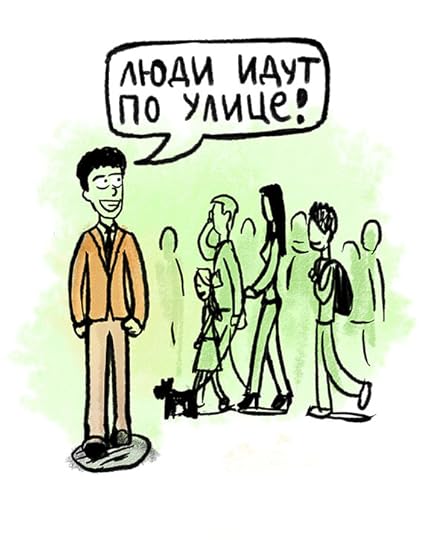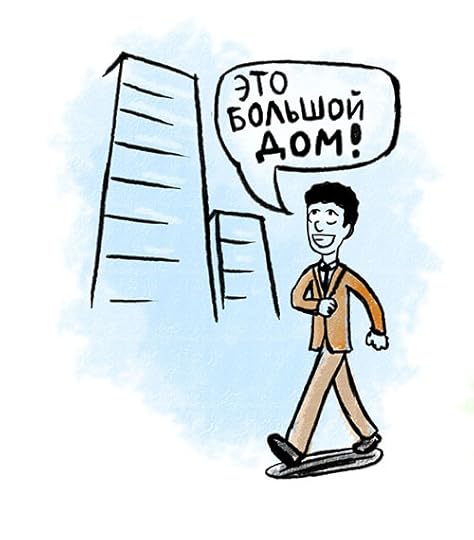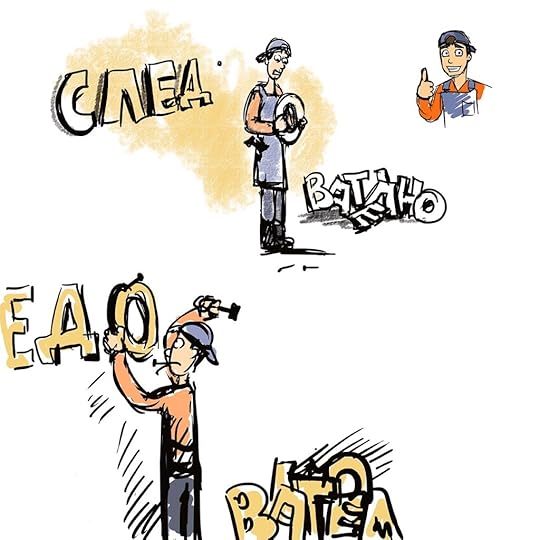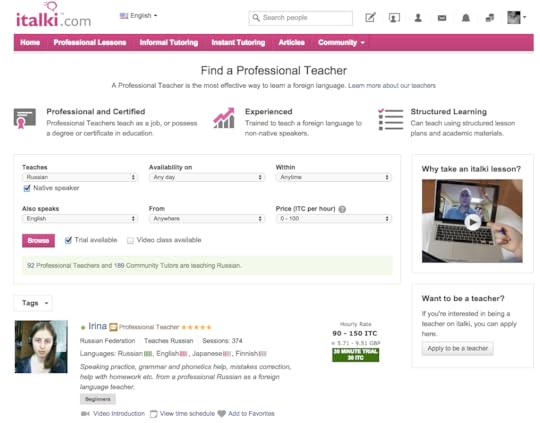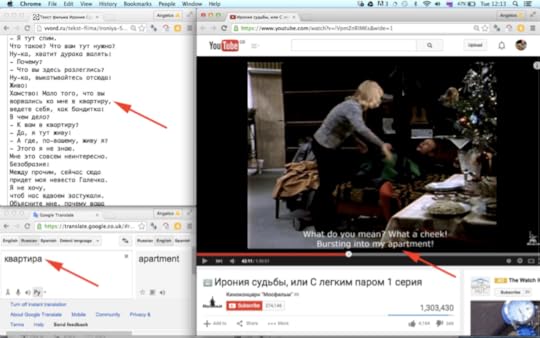Angelos Georgakis's Blog, page 6
June 22, 2015
Walk and speak Russian loudly
Imagine you walk home after work. You probably spend this time thinking about your busy schedule, tomorrow’s meeting, the bills you have to pay etc. Instead of doing that, why don’t you start a conversation with yourself loudly in Russian? Maybe you want to practise the days of the week, the verbs you learned yesterday, or talk about your plans for the evening. If you are a beginner, take a chance to look around you and describe what you see. For example, you can say things like:
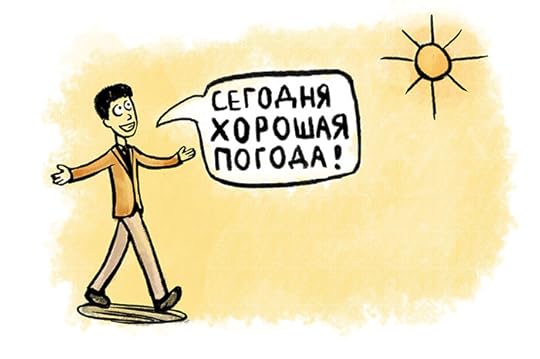
Что это? – What is this?
Это большой дом – This is a big house.
Это красная машина – This is a red car.
Сегодня хорошая погода – Today, the weather is good.
Люди идут по улице – People are walking on the street.
This is an example of a multisensory learning method which involves visual, auditory and kinaesthetic elements. You see an object in real life and you pronounce the word loudly while you walk. Research has shown that it is very effective to pair a word with an actual object this word represents. This process is similar to learning a word by associating it with an image. At the same time, you improve your pronunciation as you are forced to speak the language. Also, you can make this method even more powerful by adding an acting element. Pretend you are an actor, or a teacher. Change the tone of your voice, speak dramatically, whisper, shout with surprise! That will even more stimulate your auditory and kinesthetic senses and help you memorise better.
When we walk, the heart pumps faster, circulating more blood and oxygen to our brain. Experiments have shown that people perform better on tests of memory and attention when they walk. Walking on a regular basis also promotes new connections between brain cells and increases the volume of the hippocampus, a brain region crucial for memory (A nice article here). While you walk you can practise not only Russian, but anything you want to learn.
If you don’t walk to work, you may cycle or drive. I often practice Russian on my bike speaking loudly or singing songs by the traffic lights. Don’t be embarrassed by the people around you who may think you went crazy. People don’t care about what you do; they care about their own lives. If someone makes fun of you is because they feel embarrassed to do what you do, even if they know it is right.
Now, think about this. How do kids learn? They use all their senses. They look at something, they touch it, they bite it. They do that at home, in the restaurant, on the street, everywhere. They ask their mum how something is called and repeat a word multiple times. They listen to their voice. Why do you have to learn Russian in silence on a desk? No! Try to learn how the kids learn. Instead of asking your mum (who most probably doesn’t speak Russian), you can ask Yandex Translate or Google Translate on your mobile phone (both are great mobile apps) to remember or learn a new word while you are on the move. That’s all. Keep walking and speak Russian.
PS: The above ideas are also explained in this YouTube video from my talk at Oxford University Russian Society on how to learn Russian.
The post Walk and speak Russian loudly appeared first on Live Diversified.
June 14, 2015
Break the word down
I remember when I first came across the word ‘следовательно’: therefore. No matter how many times I tried to memorise it, I kept forgetting it! I realised I had to find a different way to get it into my head. ‘It’s a long word’, I thought. ‘Let’s try to break it down to see what happens…’ But, how do you break down a word, if you can’t see any other words in it? Google Translate is a powerful tool for this purpose because it provides instant translations as you type. So, if you start typing ‘следовательно’, you gradually get the following results:
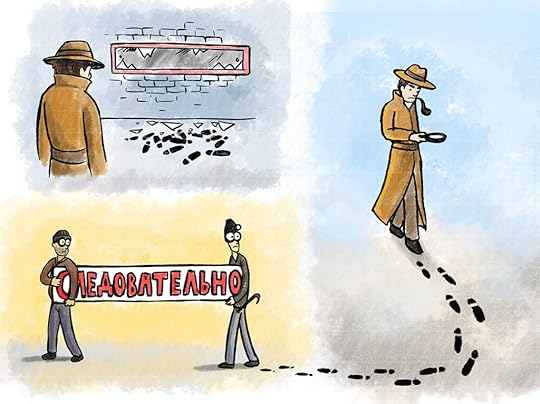 След – footprint, track
След – footprint, track
Следовать – follow
Следователь – investigator
Следовательно – therefore
If you pay attention to these four words, you can easily create a story to link them all together. For example, I can see here an investigator who follows the footprints and… therefore finds the truth! That’s it! Now, it is impossible to forget the investigator who solved the mystery! You have just managed to learn easily four words instead of just one. More importantly, these words are strongly connected with each other.
The good news doesn’t stop here. After all this process you have more chances to remember a root word or connected phrase that you didn’t initially think of. In our case, the word ‘следовательно’ probably is not the most common Russian word, but the expression:
На следующей неделе: next week
is one that a beginner probably sees quite early. The adjective ‘следующий’: next, following has the same stem – ‘след‘ – as ‘следовательно’. You have just created another link between the four words and an expression you already know.
Alternatively, you can use Wiktionary to find related words. In our case, for следовательно, there is a link to следовать under the section ‘Related terms.’ Similarly, for следовать, there is a link to след.
Hence, when you come across a long word, always try to break it down to simpler ones. The extra time spent on this process will help you memorise the targeted word easily, bring to the surface more associated words, and build strong connections in your head.
PS: All the above are also explained in this video from my talk at Oxford University Russian Society on how to learn Russian.
The post Break the word down appeared first on Live Diversified.
June 4, 2015
How to learn Russian – Talk at Oxford University Russian Society.
I was grateful to give a talk on how to learn Russian with effective techniques at Oxford University Russian Society a few weeks ago. Hope you enjoy it! Also, feel free to subscribe here and I will notify you when my new ebook ‘Learn Russian the smart way’ is free to download on Amazon.
The post How to learn Russian – Talk at Oxford University Russian Society. appeared first on Live Diversified.
May 15, 2015
Save money and learn Russian on Italki.
There is no language learning without actual communication with a native speaker. This is the ultimate goal of your learning: to be able to speak the language. However, this doesn’t mean that you have to wait until you speak perfectly. Start practising from day one!
Italki is an online language learning service where you can find teachers or native speakers and enjoy real language practise at a very low cost as opposed to traditional private lessons. You can search by teacher location, session price, availability etc. You can also see the teacher’s rating and testimonials from other students. Russian learners can choose between a wide range of tutors as Russian is spoken in a few countries like Ukraine, Latvia, Belarus etc. After you create an account, you top it up with credit-points. Each time you book a session, depending on the session’s price, the relevant points are deducted from your account. You can then connect with your teacher on Skype and begin your private lesson.
What I found really helpful is recording all the Skype conversations. Right after each session, I used to play back the recording and listen again to parts of the conversation that I had missed. This is really effective ear training as the content is directly relevant to you. These are real conversations that happened between you and a native speaker in which you talk about your life, interests, job, habits etc. It is also worth to pay attention to people’s reactions and responses because certain phrases will most probably appear again with another speaker. In the beginning, it is recommendable to keep the flow and focus on the comprehension instead of stopping on every single word to ask for explanations. You can always play back the session to nail down a beautiful word or syntax that you missed. By recording, you will save money and increase the value of a single session. More importantly, you have the opportunity to revise the material and make it more solid in your memory. Also, you will be able to judge yourself from a listener’s perspective; you can focus on your weak points, avoid repeated mistakes, and practise pronunciation of words that you struggle with.
Finally, you will definitely make friends on Italki, either teachers or students. On my first trip to Russia I had the opportunity to meet my teachers in person and spend time together. It is a great tool that you should definitely add to your learning.
The post Save money and learn Russian on Italki. appeared first on Live Diversified.
How to remember the gender of nouns ending in a soft sign -ь.
In Russian, nouns are assigned a gender; they can be masculine, feminine or neutral. It is very important to know the gender of the noun as it determines how the cases of the noun are formed. The rules are the following:
Words like ‘father’, ‘mother’, ‘uncle’ etc. relate to physical gender. Hence, ‘father’ (папа) and ‘uncle’ (дядя) are masculine whereas ‘mother’ (мама) is feminine.
If the last letter of the word is a consonant, or ‘й’, the word is masculine.
If the last letter of the word is ‘а’ or ‘я’, the word is feminine.
If the last letter of the word is ‘о’ or ‘е’, the word is neuter.
If the last letter of the word is a soft sign ‘ь’, then the word could be either masculine or feminine.
From the above rules, you can see that the only tricky words are the ones ending in a soft sign -ь. How can we easily remember the gender of those nouns?
What I have found extremely useful is to associate a word that ends in a soft sign with a meaningful adjective. For example, look at the following examples:
Красная площадь – Red Square (Moscow)
Прекрасная жизнь – Wonderful life
Летний дождь – Summer rain
Русский словарь – Russian dictionary
Темная ночь – Dark night (famous song)
In the above examples, maybe the noun doesn’t say anything about its gender but its adjective does! Adjectives ending in -ий describe only masculine nouns, whereas adjectives ending in -ая, feminine nouns. By pairing a noun ending in -ь with a relevant adjective, you will instantly recall its gender.
The post How to remember the gender of nouns ending in a soft sign -ь. appeared first on Live Diversified.
Watch Russian films in a ‘learning mode’!
Learning through films is a powerful method as it involves images, sounds, and emotions. The visual content is engaging and helps comprehension. The audio content will help you develop a general sense of the language sounds and improve your pronunciation. The Russian language, unlike other languages, has a very wide range of sound frequencies which start from 100Hz and go up to 12000Hz. If you want to reproduce all those unfamiliar sounds correctly, you need to listen a lot to the language and train your ear. Films are great in this respect as they will introduce you to tons of real life dialogues. With regard to emotions, research in neuroscience has shown that information that is tagged with strong emotional value is more easily recalled from our memory. Films are extremely effective in evoking emotions i.e. happiness for a couple in love, admiration for the main actor, empathy for a poor man, anger for the atrocities of war etc. Finally, films will help you immerse into the culture, history, and mentality of the Russian people.
But how can we watch a film in a ‘learning mode’? The setup that has worked in my case is three windows opened on the screen: actual film with English subtitles, transcript in Russian and a Google Translate window like below:
I suggest that you watch the film trying to understand as much as possible without looking at the subtitles. When you have an unknown word, press pause and look at both translation and transcript. You can find the transcript of many Russian films on Vvord or here. The Google Translator is very useful for different reasons. First, you can confirm that you match correctly the translation with the corresponding word of the transcript. Second, you can easily copy and paste from the Transcript and play back a phrase or word as many times as you want. Third, it points you to the initial form of a noun or verb which you can then investigate more. On the picture above, ‘квартиру’ is the accusative form of the noun ‘квартира’ (apartment). Finally, you can record your voice if you want to practise your pronunciation.
I understand that it would be tiring, or even impossible, to translate every single unknown word. Hence, feel free to skip through so your learning has a flow and you feel happy. Remember that learning is effective only if you are in a state of happiness and calmness. In the beginning, just focus on the unknown words that you manage to guess, or the ones you find interesting. You can always watch the film again and pick up more words.
Below, you can find the links to some popular Russian films which you can watch using the above method. If the link directs you to a subtitle file (.srt file), you just need to open the file with an editor like Notepad (Windows users) or TextEdit (Mac users). Make sure you choose ‘Cyrillic Wndows’ encoding either you are a Windows or a Mac user. Enjoy!!
Link to the film
Transcript in Russian
Ирония судьбы 1/2, Ирония судьбы 2/2
Transcript
Москва слезам не верит
Transcript
Служебный роман 1/2, Служебный роман 2/2
Transcript
Жестокий романс
Transcript
Афоня
Transcript
Любовь и голуби 1/2, Любовь и голуби 2/2
Transcript
Вокзал для двоих 1/2, Вокзал для двоих 2/2
Transcript
Двенадцать стульев 1/2, Двенадцать стульев 2/2
Transcript
Формула любви
Transcript
Покровские Ворота
Transcript
Бриллиантовая рука
Transcript
Джентльмены удачи
Transcript
Кин-дза-дза 1/2, Кин-дза-дза 2/2
Transcript
Питер FM
Transcript
В бой идут одни старики
Transcript
Осенний марафон
Transcript
Три Плюс Два
Transcript
Операция “Ы” и другие приключения Шурика
Transcript
Иван Васильевич меняет профессию
Transcript
Кавказская пленница
Transcript
Семнадцать мгновений весны
Transcript
Прогулка
Transcript
The post Watch Russian films in a ‘learning mode’! appeared first on Live Diversified.

